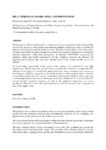Heat stress on board : risk and prevention

Use this link to cite
http://hdl.handle.net/2183/37037
Except where otherwise noted, this item's license is described as Atribución-NoComercial-SinDerivadas 3.0 España
Collections
Metadata
Show full item recordTitle
Heat stress on board : risk and preventionDate
2020Citation
Campa, R. de la; Bouza, M.À.; Louro, J. Heat stress on board : risk and prevention. A: Martínez, F.X.;Castells, M.; Martín, M.; Puente, J.M. (eds.). "Maritime Transport VIII : proceedings of the 8th International Conference on Maritime Transport : Technology, Innovation and Research : Maritime Transport'20". Barcelona: Universitat Politècnica de Catalunya. Departament de Ciència i Enginyeria Nàutiques, 2020, p. 436-451. ISBN 978-84-9880-827-8.
Abstract
[Abstract] The heat stress is the load of heat that a worker receives and accumulates in his body and that
result of the interaction between the environmental conditions of the place where he works, the
physical activity he does and the clothes he wears. The direct action of heat on the body causes
a defence against this elevation of temperature inside our organism with the aim of keeping the
internal temperature within limit parameters. As Directive 89/654/EEC concerning the
minimum safety and health requirements for the workplace indicates the thermal and
hygrometrical conditions that can cause thermal stress on the workers health have to be
studied.
On board ships, specifically in the engine room, seafarers are subjected to very high
temperatures during long time periods and to considerable variation in temperature.The
objective of this paper is to analyse the impact of thermal stress on engine room workers on
board ships, to study the consequences of such thermal stress to the organism and to review the
current labour legislation with regard to risks due to thermal stress by heat. At the same time
a relationship between heat stress and fatigue on board is stablished. It is concluded that the
current thermal regulation measures as well as the applicable legislation are clearly
insufficient. Moreover, heat stroke and dehydration are the most serious risks of exposure to
heat in the engine room.
Keywords
Heat stress
Fatigue
Health
Fatigue
Health
Editor version
Rights
Atribución-NoComercial-SinDerivadas 3.0 España
ISBN
978-84-9880-827-8






